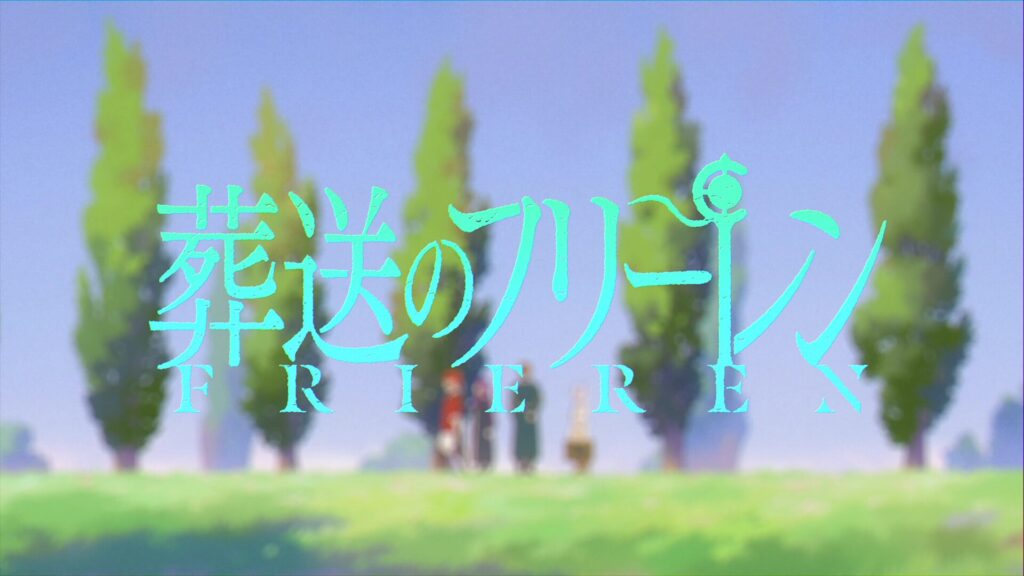
🟦 あらすじ:別れと記憶が心を結ぶ、一夜の静けさの中で
Sein learns that his old friend Gorilla /
ザインはかつての親友ゴリラが
is now in Tur, a city far to the east— /
今は東方の都市テューアにいると知り
far from the party’s destination.
一行の目的地とは正反対の方角だった。
As a severe cold wave hits the region, /
寒波がこの地域を襲い、
the party takes shelter in a cabin /
一行は小屋に避難し
and Fern comes down with a fever.
フェルンは熱を出して倒れてしまう。
While Frieren and Stark go to find herbs for her medicine, /
フリーレンとシュタルクは薬のために薬草を探しに出かけ、
they reflect on Fern’s growth /
フェルンの成長に思いを馳せ
and their emotional bonds.
それぞれの絆を改めて感じる。
Moved by their kindness and memories of the journey, /
仲間のやさしさと旅の思い出に心を動かされ、
Sein decides to part ways with the group /
ザインは一行と別れることを決め、
and head off alone to find Gorilla.
一人でゴリラを探す旅に出る。
The rest of the party continues on toward Auberst, /
残る一行は魔法都市オイサーストを目指し、
the magic capital, /
魔法の都であるその地へ
carrying warmth and quiet farewells in their hearts.
温もりと静かな別れの想いを胸に旅を続ける。
🗣️ 語彙解説
learn /lɜːrn/(動詞):知る、気づく、学ぶ
→ ここでは「知る」「知ってしまう」といった事実の把握に使われています。
destination /ˌdɛstɪˈneɪʃən/(名詞):目的地
→ 「目指す場所」「行き先」という意味で、旅や計画のゴールに使います。
shelter /ˈʃɛltər/(動詞):避難する、身を寄せる
→ 危険や寒さから逃れるために建物などに入るときに使います。
fever /ˈfiːvər/(名詞):熱、発熱
→ 風邪や感染症などで体温が上がった状態を指します。
reflect /rɪˈflɛkt/(動詞):思い返す、内省する
→ 自分の気持ちや過去について「じっくり考える」場面で使われます。
farewell /ˌfɛrˈwɛl/(名詞):別れ、別れの挨拶
→ しばらく会えなくなる人との「さようなら」を表す丁寧な言葉です。
セリフ #1 – ゴリラ探しの旅、分岐の時
フリーレン、俺はゴリラを追いかけるために旅に出た知ってるよとりあえず日も暮れそうですし、結論は明日でもいいんじゃないですか?集落の小屋貸してもらったぜ、自由に使っていいってよ
Frieren. I came with you on this journey for a chance to find him.
I know that.
The sun is going to set any minute now. Can’t this decision wait until the morning?
I asked the villagers about a cabin. They have one free, and it’s all ours.
🗣️ 語彙解説
journey /ˈdʒɜːni/(名詞):旅、旅路
→ 遠くへの移動を含む長めの旅に使います。物理的な旅や人生の比喩としても使えます。
chance /tʃæns/(名詞):機会、チャンス
→ 何かをするための「きっかけ」や「可能性」を表します。
set /sɛt/(動詞):沈む、落ちる
→ 太陽や月などが「沈む」ことを指す場合に使います。
any minute /ˈɛni ˈmɪnɪt/(副詞句):今にも、まさにすぐに
→ すぐに何かが起こりそうなタイミングを示します。
cabin /ˈkæbɪn/(名詞):小屋、山小屋
→ 簡易な作りの小さな建物、特に山や森にある木造の小屋を指します。
all ours /ɔːl ˈaʊərz/(句):完全に私たちのもの
→ 「誰にも邪魔されずに自分たちだけで使える」ことを強調する言い回しです。
📘 文法・構文・訳しにくい点の解説
I came with you on this journey for a chance to find him.
「for a chance to find him」は「彼を見つける機会を得るために」で、動機や目的を表します。
Can’t this decision wait until the morning?
「Can’t this decision wait」は仮主語の構文ではなく、倒置された疑問文で丁寧な提案を示しています。
They have one free, and it’s all ours.
「it’s all ours」は「完全に私たちのもの」という意味で、親しみを込めた所有の表現です。
📗 スラッシュリーディング訳
Frieren.
フリーレン
I came with you
君と一緒に来たんだ
on this journey
この旅に
for a chance
ある機会のために
to find him.
彼を見つけるための
I know that.
知ってるよ
The sun is going to set
太陽が沈みそうだ
any minute now.
今にも
Can’t this decision wait
この決断は先延ばしにできないか
until the morning?
朝まで
I asked the villagers
村人に聞いてみた
about a cabin.
小屋について
They have one free,
空いてるのがひとつあった
and it’s all ours.
それは全部俺たちのものだってさ
セリフ #2 – 冬の足音と小さな決断
雪ですね、また冬越えが必要になるのでしょうか?今回は険しい山脈を超えるわけじゃないからね猛吹雪にでもならない限り、大丈夫だよなりましたね
It’s snowing. Will we need to wait for winter to pass this time around?
Well, this time there aren’t any steep mountains for us to cross.
Unless a serious blizzard blows our way, we should be all right.
Looks serious.
🗣️ 語彙解説
steep /stiːp/(形容詞):険しい、急な
→ 山道や坂などが「急勾配で登るのが大変」な状態を表します。
mountain /ˈmaʊntən/(名詞):山
→ 一般的な「山」。ここでは旅の障害として使われています。
blizzard /ˈblɪzərd/(名詞):吹雪
→ 視界を奪うほどの「猛吹雪」で、旅の妨げになる自然現象です。
serious /ˈsɪəriəs/(形容詞):深刻な、重大な
→ ここでは「ただの雪」ではなく「危険な状態」の強調に使われています
📘 文法・構文・訳しにくい点の解説
Will we need to wait for winter to pass this time around?
「this time around」は「今回は」や「今度は」の意味。会話ではよく使われる表現。
there aren’t any steep mountains for us to cross.
「for us to cross」は「私たちが越えるための」という不定詞の形容詞的用法。
Unless a serious blizzard blows our way, we should be all right.
「unless」は「〜しない限り」の意味で、条件を否定的に表す副詞節。
📗 スラッシュリーディング訳
It’s snowing.
雪ですね
Will we need to wait
待つ必要があるのかな
for winter to pass
冬が過ぎるのを
this time around?
今回は?
Well,
そうだね
this time
今回は
there aren’t any steep mountains
険しい山はないよ
for us to cross.
私たちが越えるべき
Unless a serious blizzard blows our way,
猛烈な吹雪でも来ない限り
we should be all right.
大丈夫だよ
Looks serious.
なりましたね
セリフ #3 – 世界を変える魔法!?
伝説級の魔法?今までにどんな魔法があったんだ?カビを消滅させる魔法や、しつこい油汚れを取る魔法だよすごい確かにあれは世界が一変するほど便利でした
Legendary-level magic?
Have you already run into some spells like that?
Mm-hmm. We found one great spell to get rid of mold, and another to eradicate those tough oil stains.
Incredible.
Find more. Those little spells have been nothing short of life changing.
🗣️ 語彙解説
legendary /ˈlɛdʒəndɛri/(形容詞):伝説的な
→ 古くから語り継がれるほどすごい、非常に有名なものを指します。
run into /rʌn ˈɪntuː/(句動詞):出くわす、偶然見つける
→ 「偶然見かける」「遭遇する」といった意味の口語表現です。
eradicate /ɪˈrædɪkeɪt/(動詞):根絶する、完全に取り除く
→ 有害なものを徹底的に取り除く強い語です。
oil stain /ɔɪl steɪn/(名詞):油汚れ
→ キッチンや服についた「落ちにくい油の汚れ」のこと。
life changing /ˈlaɪf ˌtʃeɪndʒɪŋ/(形容詞):人生を変えるほどの
→ 「便利すぎて価値観が変わる」ような出来事やものに使います。
📘 文法・構文・訳しにくい点の解説
Have you already run into some spells like that?
現在完了形+run intoで「そういう魔法にもう出会ったの?」という意味。
to get rid of mold, and another to eradicate those tough oil stains.
「to+動詞」の不定詞が目的や機能を説明している部分構文。
nothing short of life changing.
「nothing short of」は「まさに〜そのもの」「極めて〜」の強調構文。
📗 スラッシュリーディング訳
Legendary-level magic?
伝説級の魔法?
Have you already run into /
今までに出会ったことある?
some spells like that?
そんな魔法に?
Mm-hmm.
うん
We found one great spell /
ひとつすごい魔法を見つけたよ
to get rid of mold, /
カビを取り除く魔法と
and another /
もうひとつは
to eradicate those tough oil stains.
しつこい油汚れを消す魔法だった
Incredible.
すごい
Find more. /
もっと見つけてよ
Those little spells /
ああいうちっちゃな魔法って
have been nothing short of life changing.
人生が変わるほど便利なんだから
セリフ #4 – 仲直りできない二人
ひどい状況だなおい一体何があった?シュタルク様が悪いんですはい、俺が全部悪いんです話にならないな
What a sorry state of affairs.
Hey. So, who did what to whom?
It was all Mister Stark’s fault.
Yup. Always has been, always will be.
We won’t get anywhere like this.
🗣️ 語彙解説
sorry /ˈsɒri/(形容詞):ひどい、情けない
→ 状況や状態がみじめで残念な様子を表します。
state of affairs /steɪt əv əˈfeərz/(名詞):状況、事態
→ 特に問題や混乱があるときの「ありさま」「現状」に使います。
who did what to whom /huː dɪd wɒt tu huːm/(疑問構文):誰が誰に何をしたのか
→ 原因や責任を問うカジュアルな言い回しです。
fault /fɔːlt/(名詞):過失、責任
→ 「誰のせいか」「誰が悪いか」を表す語。
get anywhere /ɡɛt ˈɛniweə/(句動詞):話が進む、成果が出る
→ 否定形で「進展しない」「解決しない」という意味になります。
📘 文法・構文・訳しにくい点の解説
What a sorry state of affairs.
感嘆文の形で「なんてひどい状況だ」と驚きや皮肉をこめた表現。
who did what to whom?
「疑問詞+助動詞+主語+動詞」の順に複雑な関係を尋ねる構文。
Always has been, always will be.
主語・動詞が省略された口語の省略構文で「昔からそう、これからもそう」。
We won’t get anywhere like this.
「このままでは話が進まない」という否定形の句動詞。
📗 スラッシュリーディング訳
What a sorry state of affairs.
ひどい状況だな
Hey. /
おい
So, who did what to whom?
それで、誰が誰に何をしたんだ?
It was all Mister Stark’s fault.
シュタルク様が全部悪いんです
Yup. /
はい
Always has been, /
昔からそうです
always will be.
これからもずっとそうです
We won’t get anywhere like this.
こんなんじゃ話にならないよ
セリフ #5 – 心の距離を埋めるために
シュタルクも反省してるあいつガキなんだ、悪気があったわけじゃない分かってます、私が意地になってしまったので謝りたいです元はといえば私のせいですし、触られたことは気にしてはいませんただ、肩を押さえた腕の力が強くて、ちょっとだけ怖いと思ってしまったんです
Stark feels bad about what he did.
He’s just a dumb kid. And he didn’t mean you any harm.
I’m sure you’re right. I think that I’m ready to apologize. I was stubborn.
I’m the one who started it all in the first place. I don’t even mind the fact that he touched me.
It’s just, the arm he used to restrain my shoulder was so strong. I guess I was startled and a little scared.
🗣️ 語彙解説
feel bad /fiːl bæd/(句動詞):後悔する、気まずく思う
→ 「悪いと思っている」「申し訳なく感じている」気持ちを表す表現です。
stubborn /ˈstʌbərn/(形容詞):頑固な
→ 気持ちを曲げず意地を張っている様子に使います。
restrain /rɪˈstreɪn/(動詞):抑える、制止する
→ 物理的・感情的に「動きを止める」「制限する」意味で使われます。
startled /ˈstɑːrtld/(形容詞):びっくりした
→ 急な出来事で「はっとする」「ドキッと驚く」感情を表します。
mean (someone) harm /miːn hɑːrm/(表現):害意を持つ
→ 相手に「傷つける意図がある」ことを指しますが、否定で「悪気はない」となります。
in the first place /ɪn ðə fɜːrst pleɪs/(副詞句):そもそも、最初に
→ 原因や経緯を語るときに「もともとは」という意味で使われます。
📘 文法・構文・訳しにくい点の解説
Stark feels bad about what he did.
「feel bad about+名詞」で「~について悪いと感じる」という構文。
He didn’t mean you any harm.
「mean 人 any harm」は「人に害意を持つ」→否定で「悪気はない」。
I’m the one who started it all in the first place.
強調構文「I’m the one who…」で「始めたのは私です」と責任を取る表現。
the arm he used to restrain my shoulder
関係代名詞+不定詞のまとまりで「肩を押さえた腕」という長い名詞句を形成。
I was startled and a little scared.
形容詞2つをandでつなぎ、「びっくりしてちょっと怖かった」という心理描写。
📗 スラッシュリーディング訳
Stark feels bad /
シュタルクも後悔してる
about what he did.
自分のしたことを
He’s just a dumb kid. /
あいつはただの子どもで、
And he didn’t mean you any harm.
君を傷つけるつもりなんてなかったんだ
I’m sure you’re right. /
きっとその通りです
I think that I’m ready to apologize. /
私もそろそろ謝りたいと思ってます
I was stubborn.
私が意地を張ってしまったんです
I’m the one who started it all /
最初に始めたのは私ですし
in the first place.
そもそも私が原因です
I don’t even mind /
触れられたことは
the fact that he touched me.
私は別に気にしていません
It’s just, /
ただ、
the arm he used to restrain my shoulder /
肩を押さえたときのあの腕の力が
was so strong.
すごく強くて
I guess I was startled /
びっくりしてしまって
and a little scared.
ちょっとだけ怖くなったんです


